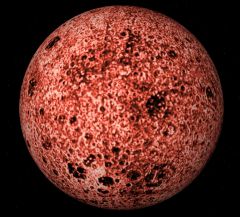90377 Sedna
Revision as of 02:15, 12 October 2024 by Arvil (talk | contribs) (Arvil moved page User:Arvil/Sandbox02 to 90377 Sedna: Move to live article.)
| 58534 Logos | |
|---|---|

| |
| 90377 Sedna from Kuiper Objects Pack.zip in Orbiter 2006P1 | |
| Designation | |
| Name | 90377 Sedna |
| Reference body | Sun |
| Planetary mean orbits | |
| Epoch | 2005.71598173516 |
| Semimajor axis (a) | 78629540000000 m |
| Eccentricity (e) | 0.855 |
| Inclination (i) | 11.934° (0.208287592918490 radian) |
| Longitude of the ascending node (LAN, ☊) | 144.514° (2.522245115673249 radian) |
| Longitude of periapsis (ϖ) | 187.21468° (3.26751257406758 radian) |
| Mean longitude (L) | 24.70671° (0.431213436835408 radian) |
| Selected physical parameters | |
| Mean radius | 1500000 m |
| Mass | 5.2435×1021 kg |
| Rotation elements | |
| SidRotPeriod | 36000 seconds (10 hours) |
| SidRotOffset | 0 |
| Obliqutiy | 0.535467015 |
| LAN | 0 |
| Note | *Elements given are from Sedna.cfg (Kuiper Objects Pack.zip) |
90377 Sedna (2003 VB12) is a dwarf planet orbiting in the Kuiper Belt and is a trans-Neptunian object. It is the farthest known object in the Solar System, and was discovered in November 2003 by Michael Brown, Chad Trujillo, and David Rabinowitz.
90377 Sedna in Orbiter
Sedna is modeled as an 1500 km body. It was introduced to Orbiter with the release of the add-on Kuiper Objects Pack.zip in August 2006.
| Add-on | Source | Version | Author | Type | Release Date | Compatibility | Wiki article |
|---|---|---|---|---|---|---|---|
| Kuiper Objects Pack | O-F Resources | 2006-08-10 | markl316 | Scenery | 11 August 2006 | ||
See also
Sedna (dwarf planet) at Wikipedia
Gallery
Sedna imaged by HST in March 2004
from Wikimedia CommonsOrbit of Sedna compared to the outer planets and Pluto
from Wikimedia Commons<?center>
| edit The Solar System | |
|---|---|
| Central star |
Sun (Sol) |
| Planets |
Mercury - Venus - Earth - Mars - Jupiter - Saturn - Uranus - Neptune |
| Natural satellites |
Moon - Phobos - Deimos - Io - Europa - Ganymede - Titan - more... |
| Add-ons |
Planets - Dwarf Planets - Small objects - Natural satellites - Alternative star systems |


